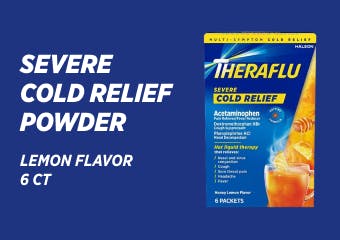How does dextromethorphan work?
Dextromethorphan is classified as a cough suppressant or antitussive medication. Antitussives help relieve coughing by calming your cough reflex, through decreasing activity in the cough center of your brain.1 Dextromethorphan is available in various forms, including tablets, liquids, capsules, and solutions.3
Dextromethorphan can be included in OTC products in combination with antihistamines, analgesics, and decongestants.1 Before taking any OTC products, be sure to read the product labels carefully.1
Common uses of dextromethorphan
Dextromethorphan is primarily used to alleviate cough symptoms caused by the following conditions:3
- Common Cold: One of the most common applications of dextromethorphan is in providing relief from the cough that often accompanies the common cold.
- Influenza: Dextromethorphan can offer relief for cough symptoms that arise from the flu.
Dextromethorphan should not be used for a chronic cough that occurs from smoking, emphysema, or asthma or if there is an abnormal amount of mucus or phlegm present with the cough.
Dosage guidelines for dextromethorphan
It is essential to follow proper dosage guidelines when using dextromethorphan to ensure its effectiveness and minimize the risk of adverse effects. Dosage recommendations may vary depending on the specific formulation of the medication, age, and medical condition. Below are general guidelines for typical dextromethorphan use:3
Adult dosage
For adults and children 12 years of age and older: Oral dosage is 10 to 20 milligrams every 4 hours or 30 milligrams every 6 to 8 hours. Do not exceed 120 milligrams in 24 hours, or as directed by a doctor.
Maximum daily dose
The maximum daily dose of dextromethorphan should not exceed 120 mg in adults and adolescents over 12 years old. It is essential to adhere to recommended dosages to prevent potential side effects.
Responsible use of dextromethorphan
Medical problems may affect dextromethorphan usage. To ensure the safe and effective use of dextromethorphan, consider the following precautions:
- Follow instructions: Always read and follow the dosing instructions provided on the medication label or as directed by a healthcare provider.3
- Do not exceed recommended dosage: Avoid exceeding the recommended dosage to prevent potential side effects or adverse reactions.3
- Exercise caution with other medications: Be cautious when combining dextromethorphan with other medications, as drug interactions may occur. Consult a healthcare provider if you are taking multiple medications.
- Avoid alcohol: Do not consume alcohol while using dextromethorphan, as it may intensify side effects and impair your judgment.3
- Seek Medical Advice: If your symptoms persist or worsen despite using dextromethorphan, consult a healthcare provider for further evaluation and guidance.3
Dextromethorphan is a widely used medication for the relief of cough symptoms associated with the common cold and flu. It is essential to adhere to recommended dosages and exercise caution when combining it with other medications. If your cough lasts for more than 7 days, comes back, or is accompanied by rash, fever, or persistent headache, stop use of Dextromethorphan. These could be signs of a serious condition. If you experience severe or persistent side effects, consult a healthcare provider promptly. By using dextromethorphan responsibly, you can comfortably manage your cough symptoms.





